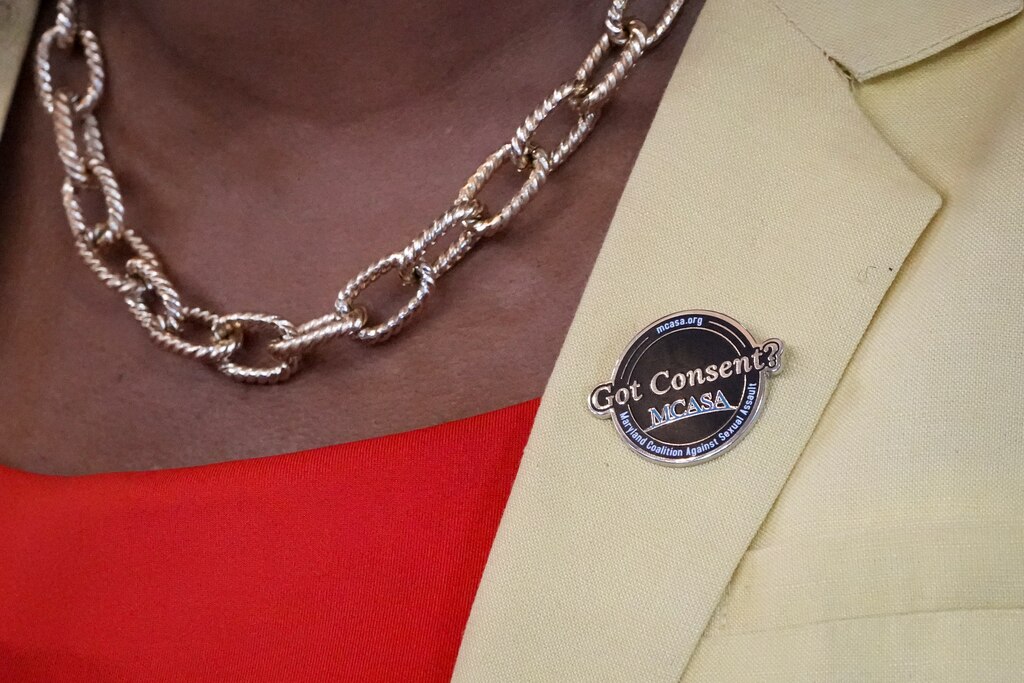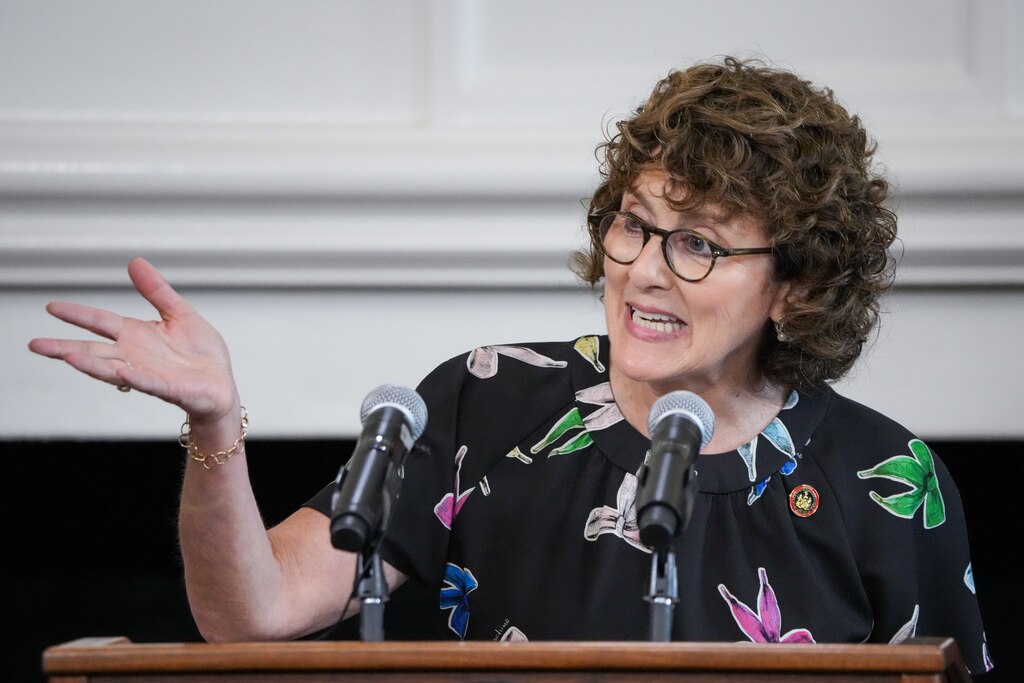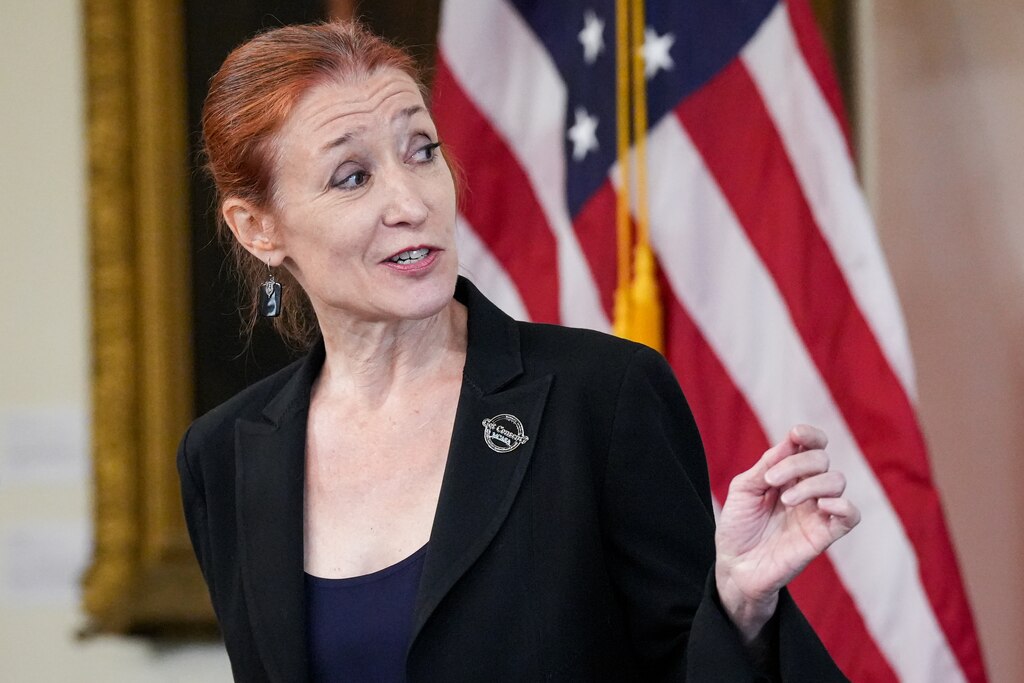Maryland officials hope a simple barcode will help survivors of sexual assault navigate a confusing criminal justice system that historically has often been hostile to those who have endured traumatic and invasive attacks.
The lines and numbers, ubiquitous in our lives for tracking packages and making purchases, will be applied to sexual assault evidence kits, enabling better tracking through labs and courts. Survivors, for the first time, will be able to check the status of their evidence and advocate for themselves if their case appears to be stalled.
“This kit is a promise of justice,” Attorney General Anthony Brown said at the State House on Thursday, holding up a large white envelope. “However for too many victims and survivors, in too many communities — not only here in Maryland, but across the country — when kits left hospital rooms, victims were left with nothing but questions. Where’s my evidence kit? When does justice come?”
Since the barcode system went into place 3 1/2 weeks ago, 14 sexual assault survivors have been given anonymous passwords to track their barcoded evidence kit. They’ve already logged in 90 times, Brown said.
The Baltimore Banner thanks its sponsors. Become one.
“What does that tell you?” the Democrat asked. “Survivors want action.”

The barcode system has been years in the making in Maryland, even as dozens of other states have implemented tracking systems.
Maryland’s system will require barcodes on new evidence kits, as well as several thousand kits in storage that have not been tested, officials said. The older kits are required to be entered into the barcode system by the end of 2025.
Michigan was the first state to create a tracking system in 2014, according to End the Backlog, an initiative of the nonprofit Joyful Heart Foundation that advocates for clearing backlogs of untested evidence kits and implementing policies to prevent future backlogs.
Maryland began formally discussing the idea of a barcode tracking system in 2017, when a Sexual Assault Evidence Kit Policy and Funding Committee was created. By 2019, the state started an inventory of just how many evidence kits existed, work that was stalled in 2020 and 2021 due to the coronavirus pandemic, said Carisa Hatfield, an assistant attorney general who advises the committee.
The Baltimore Banner thanks its sponsors. Become one.
It took until 2022 to complete that work and then it wasn’t until 2023 that the state solicited companies to provide a tracking system. “Once we had it, we moved as quickly as we could,” Hatfield said.
The contract was awarded to InVita Healthcare Technologies, for up to seven years for a total of $2.1 million. Federal grants will pay for it.
Though the journey to set up the system has been long, advocates applauded the state for getting it up and running.

Angela Wharton said she was raped at gunpoint in Baltimore in 1996, and it took courage to undergo a forensic exam after the attack.
“My body was a literal crime scene, but I endured it,” she said. “I endured it with the hope that justice would prevail and my perpetrator would be held accountable for his heinous actions.” She learned years later that the evidence had been “callously discarded,” an action that re-victimized her, leaving her to feel powerless.
The Baltimore Banner thanks its sponsors. Become one.
With the new tracking system, she hopes that survivors will be taken seriously and the evidence in their cases will be handled properly.
“This groundbreaking initiative represents a real hope for survivors like me, who have endured the anguish of having their trauma dismissed and their pursuit of justice thwarted by a system that failed to protect and serve,” she said.
Del. J. Sandy Bartlett, an Anne Arundel County Democrat, said the new system is “a step in the right direction” to help survivors, who need to be better empowered and supported as they navigate the criminal justice system.

State Sen. Shelly Hettleman was inspired to push for better testing and tracking after reading a news article about a woman who was brutally sexually assaulted, including with a beer bottle, but was so traumatized by the exam and how she was treated by Baltimore County Police that she dropped the case. When she sought to reopen the investigation later on, she learned the evidence was destroyed.
Since then, Hettleman, a Baltimore County Democrat, has sponsored legislation and pushed for reforms to test and track evidence kits.
The Baltimore Banner thanks its sponsors. Become one.
“It has not been easy and at times we’ve had our battles,” Hettleman said.
In 2023, Hettleman and Bartlett passed a bill setting standards for how the tracking system will be used. “It wasn’t good enough to build it,” Hettleman said. “We actually have to hold stakeholders accountable for interacting with it.”

And that’s where more work needs to be done, said Lisae Jordan, executive director of the Maryland Coalition Against Sexual Assault.
Outside of the police and prosecutors, currently only survivors are able to access the system to track the progress and location of an evidence kit. While the system launch is “a huge step forward,” the state needs to expand access to sexual assault crisis programs and child advocacy centers, as required by the 2023 law.
Jordan lamented that it took the prodding of lawmakers and advocates to get the state to implement the system. She maintains the state could have done it without being propped up by legislation.
The Baltimore Banner thanks its sponsors. Become one.
“It’s been an enormous fight to have the government take rape cases seriously,” she said.

Scott Shellenberger, the longtime state’s attorney in Baltimore County, acknowledged as much. The county has been repeatedly accused in the past of mishandling sexual assault complaints. But the county also has taken steps toward improvement, including recently announcing plans to test thousands of slides of evidence frozen by Greater Baltimore Medical Center.
“There were many times where I would sit in these meetings and I would think: ‘Wow, there’s really going to be accountability about whether police and prosecutors are doing their jobs.’ And as you heard, that includes me,” said Shellenberger, a Democrat.
He continued: “But then as I would listen to folks, I realized that’s exactly what we needed to do. There needs to be accountability, and that’s what this tracking system will do.”
Gov. Wes Moore said the system provides accountability from all angles.
“It’s very easy for these kits to get lost when there’s no accountability,” the Democratic governor said. “That needs to change, and it changes today.”



Comments
Welcome to The Banner's subscriber-only commenting community. Please review our community guidelines.